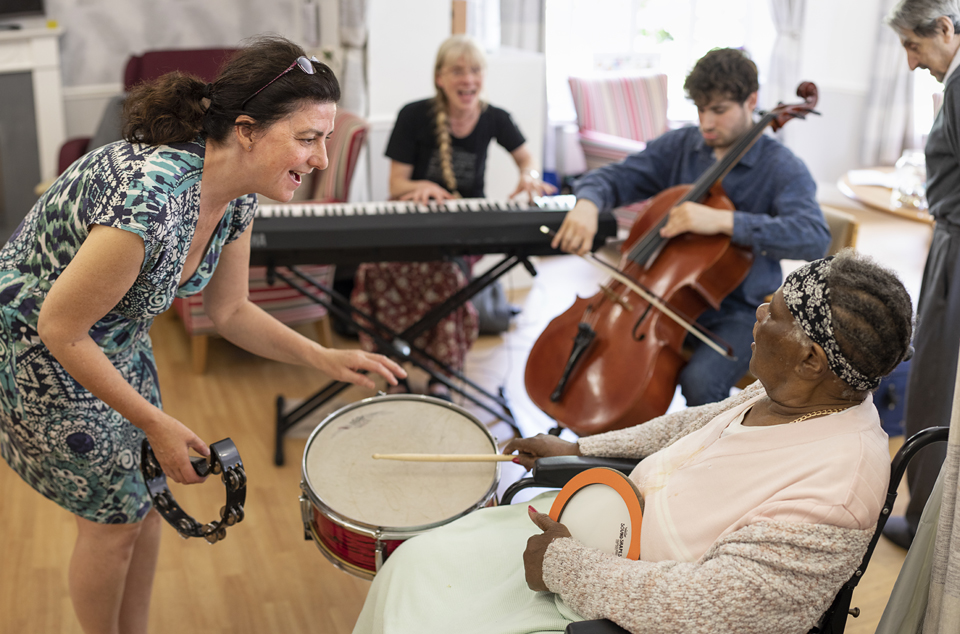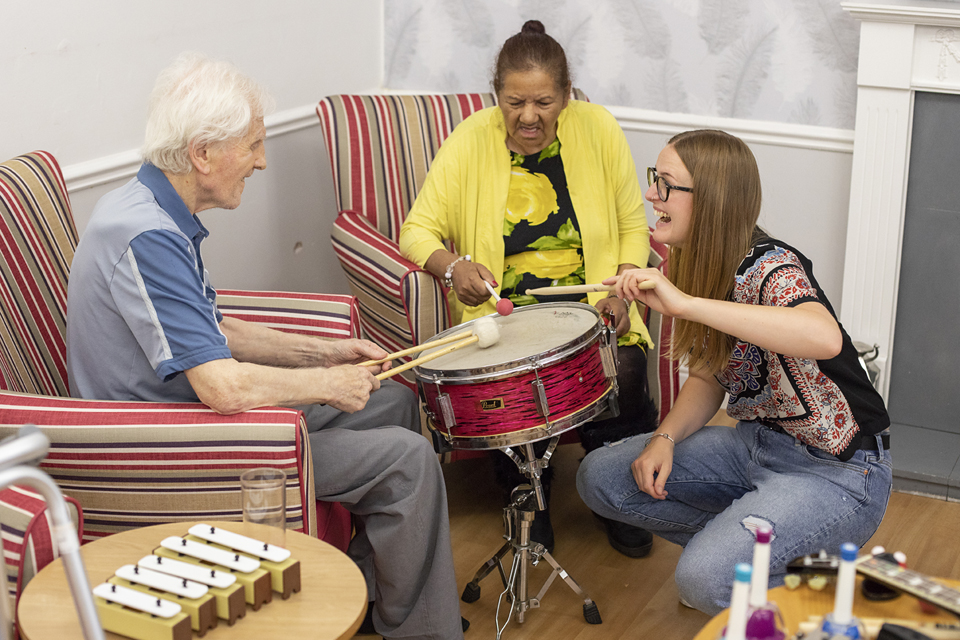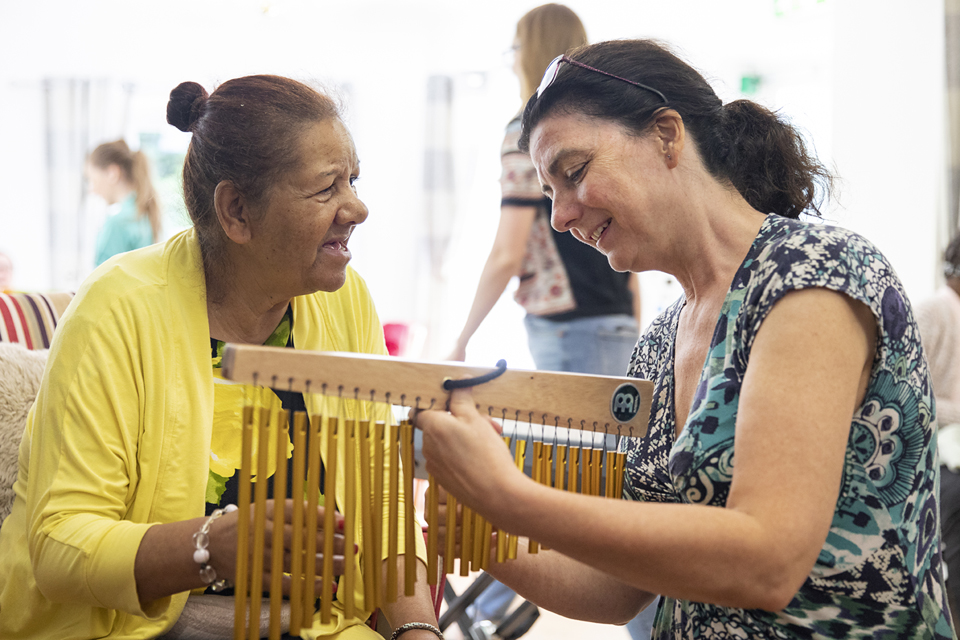Redefining the lives of people living with dementia
Posted on August 14, 2019
Article originally published by Didsbury Magazine Aug 2019 here

There are currently over 21,000 people living with dementia in Greater Manchester, with a surprising percentage diagnosed before the age of 65
We meet the Manchester-based orchestra who, using a unique approach to music making, are helping to improve quality of life for people with dementia and whose world-leading methods are being rolled out across the globe.
A history of ground-breaking work
When it comes to turning musical convention and the concept of ‘orchestra’ on its head, Manchester Camerata have form. They’ve opened the Pyramid Stage at Glastonbury and played alongside dance DJs to deliver Haçienda Classiçal; little wonder The Times has called them “probably Britain’s most adventurous orchestra”. Risks are taken, expectations shattered, and all vestiges of elitism or untouchability unanimously erased
“Innovation is in our DNA,” says Paul Davies, Manchester Camerata’s Head of Communications and Development. “It’s about reassessing the role of an orchestra; seeing the possibilities and opportunities and making a difference.”
This social change ethos is reflected most clearly (and poignantly) in their Camerata in the Community programme, which encompasses their dementia-related work.

Music in Mind
Memory loss is most commonly associated with dementia, but the impact on an individual can be so much bigger – frustration, anxiety, loss of choice, personal dignity and empowerment, and reduced quality of life.
Music in Mind – the ground-breaking music-making programme Manchester Camerata launched in 2012 – takes place in care homes, housing schemes, day care centres and community settings and runs across 15 weeks.
Small groups comprising people living with dementia (and sometimes their partners/relatives), their carers, a music therapist and a Camerata musician come together to improvise, with the entire session being led by the people with dementia and supported by the musicians:
“It’s not structured in any way, it’s totally improvised,” explains Paul.“Our musicians are experts in listening, gauging what’s happening in a room and taking the lead from the participants. The person living with dementia will decide what instrument they want to play, and our musicians will support them. Everyone in the room is equal and has influence. A musical, wordless conversation ensues; a transformative experience that exists in the moment. Living with dementia can be isolating, but these sessions are life affirming.”
Research confirms astonishing impact
In 2015, a piece of research focussed on the orchestra’s improvisational model was started by Dr Robyn Dowlen. Robyn’s ESRC-funded joint PhD studentship with the University of Manchester evaluated the impact of the sessions and the recently published results created a new discourse, which focuses on the creativity and musical identity of people living with dementia.
Previous evaluation of Music in Mind by HKD Research has confirmed positive impacts in participants’ social, emotional, communication and musical skills. For one care home, by week four, 90% of participants’ moods had improved and there was an increase in their social, communication and musical skills. By week seven, this increase was evident in almost everyone taking part. The effect is cumulative, the more sessions attended, the greater the benefits.

And it wasn’t just people living with dementia who benefitted; family members were now able to communicate with their loved one through music, and carers felt more confident in making connections. “The change in everyone is profound,” continues Paul,“and, when the programme ends, we always leave the carers with instruments and the necessary skills, so that they can continue this legacy.”
Raising awareness of young onset dementia Many people connect dementia to older generations, but, nationally, there are in excess of 40,000 people aged under 65 living with it. Awareness is low, as Paul explains:
“Post-diagnostic support services in the community for younger people are nothing like they are for older people. That’s why we’ve started running sessions with them, similar to Music in Mind but based around structured composition – a chance to write lyrics and instrumental music that express people’s emotions – both positive and negative. Again, they are the composers, artists in their own right.”
Additionally, the orchestra have just completed a Greater Manchester tour of Dementia Voices – a piece of music theatre written by Mancunian playwright and poet Louise Wallwein, which centres on the lives of two people with young onset dementia and their family members. The piece answers the question ‘what is it like to live with young onset dementia?’ and is interspersed with Camerata music.
“Yes, the piece expressed the darkness and difficulties,”reflects Paul, “but Louise also showed that there can be times of happiness and joy, which is where music comes in.
Global upscaling
Manchester Camerata – a registered charity – currently deliver projects for people living with dementia across five Greater Manchester boroughs. The goal is not only to expand the work across the region, but for the orchestra to become a global thought leader in health and wellbeing work in the arts by 2022.
The journey toward this status is well underway; a British Council-led relationship with Japan has been established, Music in Mind ‘best practice’ sessions have already taken place in Tokyo, Osaka and, most recently, in Taipei, Taiwan.
“Japan and Taiwan have an ageing population,”says Paul, “but little participatory music provision for older people. We went over there to open orchestras’ minds to the possibilities, and more visits to other countries are in the pipeline.”
A nationwide shift
Paul explains how their programme is part of a bigger nationwide shift towards ‘social prescribing’, whereby healthcare professionals, rather than medicate, prescribe social wellbeing pursuits, including arts activities. The orchestra, which already works in local primary schools, using music to encourage social development, recently started working with Maggie’s Centre – exploring music therapy for people living with cancer.
“We are advocating and influencing this on a national level,”says Paul. “These activities are primary care not secondary. For example, currently, only 5% of care homes in the UK benefit from musicmaking, yet its power is infinite. The activities are out there, people just need to be connected to them.”
Seeing is believing “There is currently no cure for dementia,” Paul concludes, “but people can be supported to live positive, creative lives and music is fundamental to that, but our quality work requires funding.
Our ambition is to upscale this vital programme across Greater Manchester, so more people benefit. We have already secured a third of our fundraising target to make this happen. I invite people to pledge some time to get in touch, so I can explain more about what we do and, ideally, arrange to experience a Music in Mind session first-hand. Seeing is believing.”
Contact Paul: pdavies@manchestercamerata.com Find out more: cameratacommunity.co.uk
